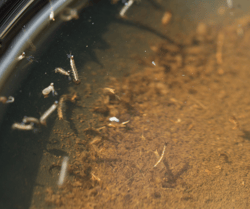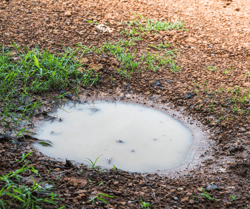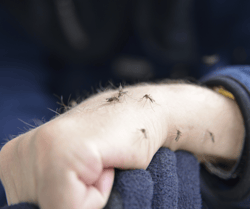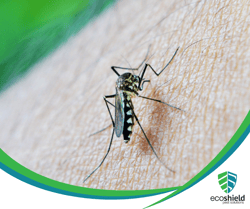Mosquitoes have undoubtedly managed to make their mark on your summer memories. You may have swatted, sprayed, and swerved to avoid them, but their presence was likely unavoidable. Now, as fall weather approaches, these buzzing nuisances will soon begin to retreat, allowing you to reclaim your outdoor spaces and enjoy nature without the constant worry of itchy welts and the risk of mosquito-borne diseases. With reprieve just on the horizon, you may be left anxiously wondering: so, when does mosquito season actually end?
Mosquito Biology, Behavior, and Key Facts
Mosquitoes belong to the family Culicidae and are found worldwide, except in Antarctica. With over 3,500 known species, these tiny creatures have been both a frustration and a health concern to humans for centuries. Their biology and behavior make them some of the most adaptable and efficient bloodsuckers in the insect kingdom, proving to be an onerous opponent.
Mosquitoes undergo a complete metamorphosis, consisting of four life stages: egg, larva, pupa, and adult. Female mosquitoes are the ones responsible for those dreaded bites as they require a blood meal to nourish their developing eggs. The males, on the other hand, feed primarily on nectar and plant juices. Interestingly, mosquitoes detect their hosts through various cues, including body heat, carbon dioxide emissions, and even certain chemical compounds present in our sweat.
Blood-sucking female mosquitoes possess specialized mouthparts called proboscis, which they use to pierce the skin and extract blood from their victims. During the feeding process, they inject saliva containing anticoagulants, which prevent the blood from clotting and allow them to extract their fill without interruption. Unfortunately, this is also what causes the itchy and irritating reaction on our skin after being bitten.
Their breeding habits also contribute to their notoriety. Most mosquitoes lay their eggs in standing water, which can be as small as a puddle or as large as a stagnant pond. The larvae, commonly known as "wigglers" due to their wriggling motion, thrive in these aquatic environments, feeding on organic matter and microorganisms until they pupate and eventually emerge as adult mosquitoes.
Beyond being a mere annoyance, mosquitoes can also pose a significant health risk as carriers of various diseases. Some of the most notorious mosquito-borne illnesses include malaria, dengue fever, Zika virus, West Nile virus, and chikungunya, affecting millions of people around the globe each year.
As a result of their widespread presence and ability to adapt to different environments, mosquito control and management remain crucial aspects of public health efforts. Understanding their biology, behavior, and ecological roles is essential for developing effective strategies to mitigate their impact on human populations during peak mosquito season. Luckily, mosquitoes are not a year-round concern for most homeowners in the United States as mosquitoes, while highly adaptable, cannot survive temperatures below 50 degrees Fahrenheit.
 The larvae, commonly known as "wigglers" due to their wriggling motion, thrive in these aquatic environments, feeding on organic matter and microorganisms until they pupate and eventually emerge as adult mosquitoes.
The larvae, commonly known as "wigglers" due to their wriggling motion, thrive in these aquatic environments, feeding on organic matter and microorganisms until they pupate and eventually emerge as adult mosquitoes.
Are Mosquitoes Considered to be Seasonal Pests?
Yes, mosquitoes are often considered seasonal pests. The extent of their seasonality can vary based on the geographical location and climate conditions of a particular region. In more temperate regions, where there are distinct changes in weather patterns, mosquitoes are typically more active and abundant during the warmer months, especially in late spring through summer and early fall.
During the warmer months, mosquitoes thrive and reproduce more rapidly due to increased temperatures, which accelerate their development from egg to adult. Additionally, standing water – a common breeding ground for mosquitoes – is more prevalent during these seasons, providing them with suitable habitats for laying eggs and nurturing their larvae.
As temperatures drop and winter approaches in temperate regions, mosquito activity declines significantly. Mosquitoes are ectothermic organisms, meaning their body temperature is regulated by the external environment. As temperatures become cooler, their metabolic rates decrease, leading to a yield in their biological processes, including feeding and reproduction.
In contrast, in tropical regions or places with consistently warm and humid climates, mosquitoes may persist year-round, and their activity might not be as strictly seasonal. Nonetheless, even in these regions, there can be variations in mosquito populations, with certain species more prevalent during specific times of the year.
While mosquitoes may be seasonal pests in some areas, it's essential to remain vigilant year-round about mosquito control and prevention, especially in regions with mild winters or during unusually warm periods. Mosquito-borne diseases pose a health risk, and taking measures to reduce mosquito populations and protect against bites is crucial regardless of the time of year.
 Standing water – a common breeding ground for mosquitoes – is more prevalent during these seasons.
Standing water – a common breeding ground for mosquitoes – is more prevalent during these seasons.
When Does Mosquito Season End in the United States?
As mentioned, mosquito activity can vary vastly depending on geographic location. In northern states with colder climates, mosquito activity starts to decline as temperatures drop during the fall months. By the time winter arrives, mosquitoes become inactive or die off, and their populations decrease significantly. Mosquito season typically ends around October in these areas.
In more temperate regions, such as the southern states and parts of the West Coast, mosquito season can extend for a more extended period. In some areas, mosquitoes may remain active year-round due to milder winters and sufficient breeding habitats. It's important to note that mosquito activity can also be influenced by local factors, such as rainfall patterns and the presence of standing water, which provides breeding sites for mosquitoes. Additionally, different mosquito species may have distinct seasonal patterns and responses to changing weather conditions.
 In some areas, mosquitoes may remain active year-round due to milder winters.
In some areas, mosquitoes may remain active year-round due to milder winters.
Do I Need Year-Round Mosquito Protection?
The need for year-round mosquito protection depends on the climate and mosquito activity in your specific area. In regions with cold winters (50 degrees or less), where mosquitoes become inactive or die off during the colder months, the need for mosquito protection diminishes significantly during the off-season. In such areas, you may not require year-round mosquito protection.
However, in regions with milder winters or tropical climates, where mosquitoes can remain active throughout the year or have extended activity periods, year-round mosquito protection becomes more important. Mosquitoes can still pose a risk of transmitting diseases and causing irritating bites during these periods.
Even in regions with distinct mosquito seasons, it's crucial to consider the potential resurgence of mosquitoes as temperatures start to rise in spring. Mosquitoes can quickly breed and multiply in standing water, so early preventive measures in the spring can help control their populations and reduce the number of mosquitoes later in the season.
In the United States, several states have regions where mosquitoes remain active or have extended activity periods, making year-round mosquito protection more relevant. The need for year-round protection is particularly significant in states with milder winters or tropical climates, as mosquitoes can persist throughout the year in these areas. Some of the states where year-round mosquito protection may be necessary include:
- Florida: The warm and humid climate in Florida sustains mosquito populations year-round, with some species remaining active even during the winter months.
- Texas: Texas experiences mild winters in many regions, allowing mosquitoes to remain active for a large part of the year.
- Louisiana: The warm and wet conditions in Louisiana provide a conducive environment for mosquitoes, and they can be active throughout much of the year.
- Hawaii: Being a tropical state, Hawaii has a consistent mosquito presence throughout the year.
- Southern California: Certain regions of Southern California have milder winters, which may result in mosquitoes being active for extended periods.
- Georgia: Georgia's climate allows mosquitoes to be active for a significant portion of the year.
- South Carolina: Like Georgia, South Carolina's climate sustains mosquito activity for an extended period.
- Alabama: Alabama's warm and humid climate provides favorable conditions for mosquitoes year-round.
- Mississippi: Mississippi's climate can support mosquito populations throughout much of the year.
- Louisiana: Similar to other Gulf Coast states, Louisiana's climate allows mosquitoes to remain active for an extended season.
It's important to note that within these states, the mosquito activity levels can vary depending on specific regions and local environmental conditions. Additionally, while year-round mosquito protection may be more relevant in these areas, it is still essential to take preventive measures during the active mosquito season in other states to reduce the risk of mosquito-borne diseases and bites.
.png?width=250&height=210&name=Mosquito%20Swarm%20(1).png) The need for year-round protection is particularly significant in states with milder winters or tropical climates.
The need for year-round protection is particularly significant in states with milder winters or tropical climates.
How can I mitigate mosquito presence year-round?
Even in regions with distinct mosquito seasons, it's crucial to consider the potential resurgence of mosquitoes as temperatures start to rise in spring. Mosquitoes can quickly breed and multiply in standing water, so early preventive measures in the spring can help control their populations and reduce the number of mosquitoes later in the season.
Regardless of the climate in your area, it's essential to stay vigilant and take preventive measures when mosquitoes are active. Here are some general tips for mosquito protection:
- Eliminate Standing Water: Remove or empty any containers, buckets, flower pots, or other items that can collect water around your home. Mosquitoes use standing water as breeding sites, and removing these sources can help reduce their numbers.
- Use Mosquito Repellents: When spending time outdoors, especially during peak mosquito hours (dawn and dusk), use mosquito repellents that contain DEET, picaridin, or other EPA-approved ingredients to protect yourself from bites.
- Wear Protective Clothing: If possible, wear long-sleeved shirts, long pants, and socks when in mosquito-prone areas to minimize exposed skin.
- Install Screens: Ensure that windows and doors have proper screens to keep mosquitoes out of your living spaces.
- Consider Outdoor Mosquito Control: In areas with high mosquito activity, using outdoor mosquito control measures, such as mosquito traps or insecticide treatments, may help reduce their numbers in your vicinity. A trusted pest control provider can provide a tailored mosquito mitigation plan that is best suited to your particular geographic location and climate.
By following these precautions and being aware of the local mosquito activity patterns, you can significantly reduce the risk of mosquito-borne diseases and enjoy a more comfortable outdoor experience regardless of the time of year.
 EcoShield Pest Solutions offers year-round protection against various pests, including mosquitoes.
EcoShield Pest Solutions offers year-round protection against various pests, including mosquitoes.
Can EcoShield Pest Solutions treat and prevent mosquitoes?
Yes! With EcoShield’s mosquito service, we target mosquitoes in every stage of their life cycle to rid you of pesky adult mosquitoes and also prevent them from being able to reproduce. Mosquito Shield offers comprehensive, year-round protection against mosquitoes, making it the perfect option for those living in warmer climates. Give us a call or fill out the form on this page today for mosquito protection in your yard.
